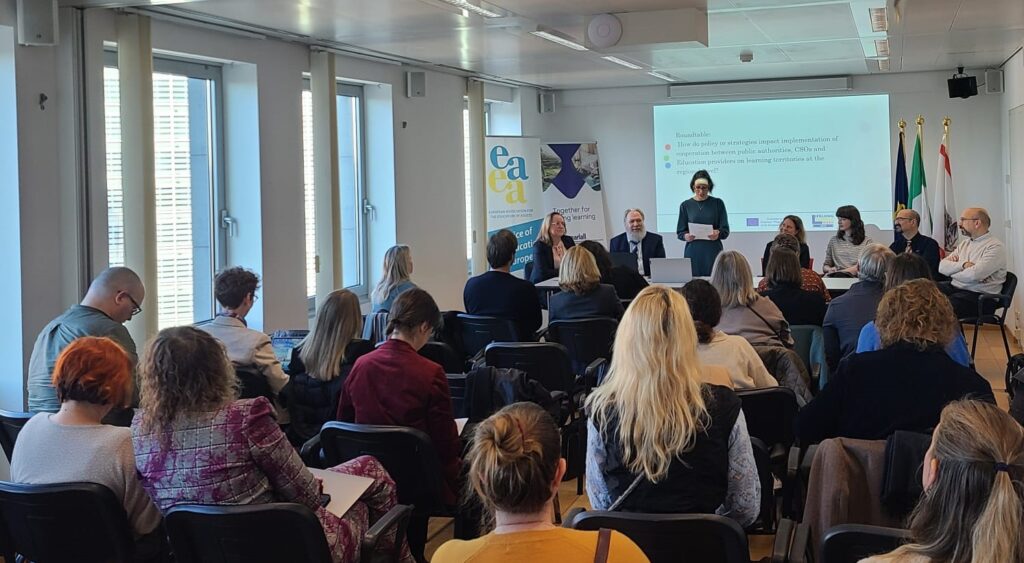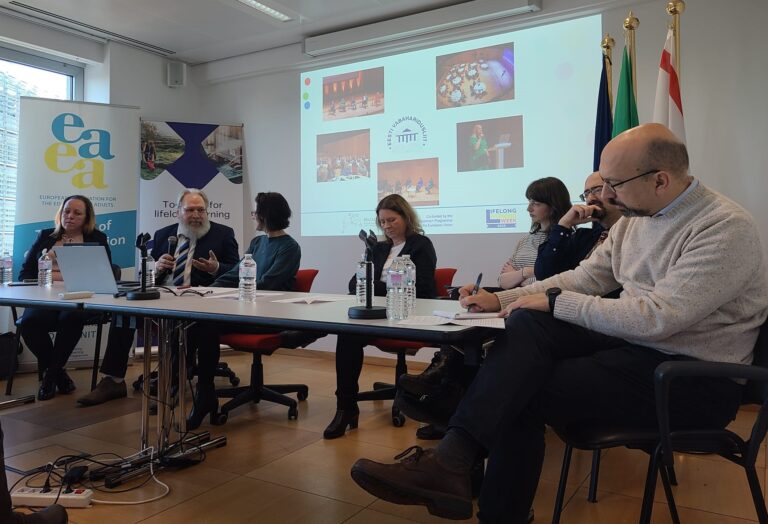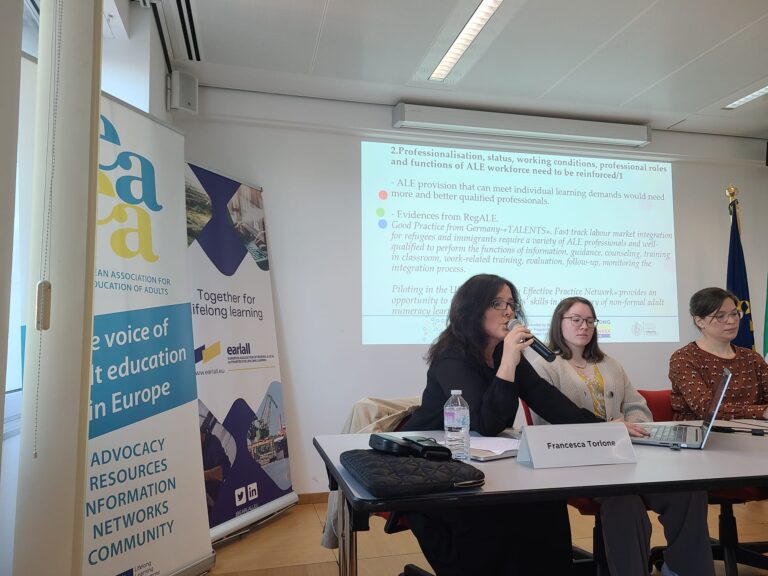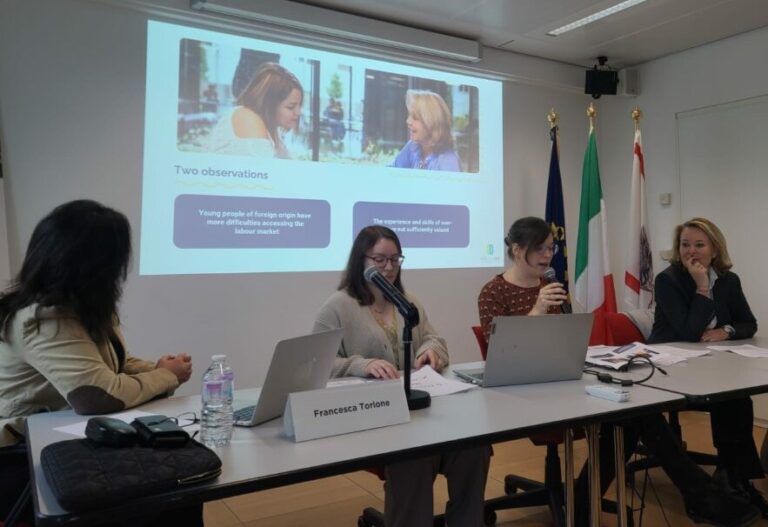Capacity-Building in Adult Learning and Education: What regional strategies and tools for success? RegALE project final conference brings room for reflections
Written by EARLALL colleagues. The original text is available here.

The RegALE project comes to a close
On November 28, EARLALL and EAEA co-organised the final conference for the Erasmus+ REGALE – Regional Capacity for Adult Learning and Education – project. The event welcomed over 60 people and was focused on presenting the tools and strategies which make development in Adult Learning and Education (ALE) initiatives possible at the regional level. The event was hosted and opened by the Tuscany Offices in Brussels, a vice president of the EARLALL network, and also the region of two of the project partners, Lucca Municipality and the University of Florence. Tina Mavrič, Project Manager of the RegALE project at the European Association for the Education of Adults (EAEA) welcomed participants to the event and moderated the rest of the conference.
Mentoring as a tool to promote lifelong learning at the regional level
Anne Rudisuhli, Committee of the Regions Rapporteur, Mentoring: a powerful and meaningful tool for the Europe of Tomorrow and Member of the Bouches-du-Rhône Departmental Council, presented a keynote speech on mentoring as a powerful tool of lifelong learning. MsRudisuhli’s discourse underscored the transformative power of learning in confronting societal challenges while highlighting the importance of ongoing growth and adaptation. Central to the discussion was the recognition of mentoring as a potent instrument in combating inequalities, fostering individual and professional development, and nurturing social inclusion, solidarity, and tolerance. Ms Rudishli shared the French national experience through Le Collectif Mentorat, an organisation formed in 2019 comprising 73 organisations which develop mentoring programs.
As rapporteur for the Committee of the Regions Opinion on Mentoring, Ms Rudisuhli shared some of its key proposals: defining a common European quality level, regional and local authorities should allocate further funds to mentoring and inclusion programs, including the increase of the ESF+ budget. Finally, she concluded that mentoring is a powerful tool for lifelong learning as it goes beyond formal education and fills in gaps of guidance that other tools cannot.
Following this speech, Elisabeth Verniers, Advocacy Manager at Duo for a Job, a mentoring organisation based in Brussels, shared her practical experience of working with mentoring. Duo for a job began following two observations: that young people of foreign origin had more difficulties in accessing the labour market, and that the experience of those over 50 was not sufficiently valued. With this, the organisation was developed and has matched 6786 Duo pairs. Adaptability is a key advantage of their mentoring program, in addition to the added skills acquired by both the mentors and the mentees.
Lessons learnt from the REGALE project
Following the introduction to the conference’s theme, Francesca Torlone, professor at the University of Florence, summarised the key lessons from the RegALE project, taken from the publication of the project, ‘Adult Learning Policies in Europe. An Insight of Regional and Local Stakeholders’. One of the key points underlined included that the target of adult learning needs to be widened to include low-skilled adults, reducing the ‘learning-exclusion equilibrium’. Moreover, Ms Torlone pointed to the variety of best practices in ALE that the project identified, which can also be found on the map of best practices.
Roundtable on what tools and strategies for cooperation and success in ALE?
The final section of the conference proposed a roundtable answering the question ‘How do policy/strategies impact the implementation of cooperation between public authorities, CSOs and Education providers on learning territories at the regional level?’ The panel was moderated by Ms Naomi Philips (Deputy Chief Executive Learning and Work Institute, UK) and invited the following speakers: Ms Andrea Bernert-Bürkle, Head of EU Projects, VHS Baden Wurttemberg; Mr Sulev Lääne, ENAEA; Ms Margit Düüna, Chairman of the Board of Estonian Non-Formal Adult Education Association; Dr Kate Smyth – Strategic Communications Officer, AONTAS; Dr. George A. Koulaouzides, Assistant Professor of Adult Education at the Hellenic Open University and Mr. Miguel Fernandez Diaz, Adult Skills Policies, European Commission. The discussion included best practice examples from each panellist on how they foster conditions, tools and strategies for adult learning and education in their territories.
For example, in the case of Baden Württemberg (an EARLALL member), Andrea Bernert-Bürkle presented how in the context of RegALE, vhs Baden Württemberg (the Adult Education Association in the region) proposed work-based learning as well as a mentoring program related to this. The result was that the ALE system was able to better reply to demographic challenges and changes. As for the European context, Mr Miguel Fernandez Diaz, Adult Skills Policies, European Commission, presented how the European Commission is giving support to actors involved in upskilling initiatives, notably through the Pact for Skills initiative as part of the Skills Agenda. The Pact for Skills has reached over 1,500 members and 20 large-scale skills partnerships (sectoral partnerships of EU dimension) have been established in all industrial ecosystems. An info sheet is available on the basic elements of the Pact, in addition to a search tool for Pact members, including a search tool on funding opportunities.
Ms Naomi Philips (Deputy Chief Executive Learning and Work Institute, UK) shared her conclusions and insights from the panellists. She stated that it is clear there is an important role for policy and legal frameworks to adapt at the regional level to facilitate ALE, in addition to the fact that providers need to be open-minded and flexible. She also highlighted the potential of ALE to provide resilience in communities, through encouraging a lifelong learning perspective and adaptable solutions.
Cooperation is key
Finally, Charlotte Ede, Communications and Projects Officer at EARLALL, concluded that “cooperation, particularly among stakeholders at the local and regional level, is essential for lifelong learning to grow and continue”. The event was closed by Raffaela Kihrer at EAEA, who thanked the project partners and the external participants.




anak haram tetangga
Capacity-Building in Adult Learning and Education: What regional strategies and tools for success? RegALE project final conference brings room for reflections